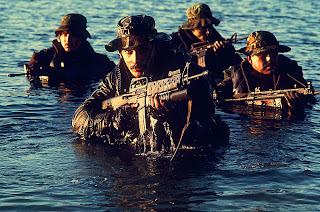Katrina Stories

by Donn Cooper
Around the Fire
Just about everyone I've spoken with from southern Louisiana has some horrific personal account of loss or hardship during and after Hurricane Katrina in 2005. Homes were flooded, personal belongings destroyed, lives ended. I've heard of grandmothers dying in the attic and entire families swimming through septic sludge to flee the city after Katrina made landfall. It goes without saying that these narratives need to be repeated, to recognize the suffering and to burn into the American consciousness the painful memory of unpardonable social and political failures.
Explaining how Katrina happened—describing, for one, the modern engineering mechanisms that permitted the city's population to exist in almost an amphibious natural environment—would take every volume of the Encyclopedia Britannica, and then some. Grasping the entire rhyme and reason is nearly impossible because New Orleans has long been a literal sump of problems. Then again, ascertaining causes is always nearly impossible in a catastrophe, especially for those involved. Survivors cope by sharing stories of their tribulation and deliverance. In contrast to an abstract time-line of contributing factors--or, in the case of Katrina, a compilation of oceanographic charts and congressional budgets--their immediate experience is something real and tangible to which they can hold.
At the Door
However, another thing begins to happen, other stories surface as if conjured from dreams. They're unattributable, like urban myths. And similarly, they speak to the collective phobias and psychoses of a population. What could be scarier for the American family than mistaking a giant sewer rat for a pet dog? (You've heard that one, haven't you?) The very idea threatens the iconic, Leave It to Beaver image and attacks a sense of safety, tied to cleanliness. Less trivial, it's perfectly conceivable for talk to circulate among New Orleans African-Americans that the levee in the Lower 9th Ward had been exploded. For a community that had been disenfranchised for so long, the story becomes almost a wish-fulfillment of their worst fear.
Among a group with an opposite and congenial relationship to power, the stories that arise in crisis can be ones of confirmation and fanciful hope. What's that, there were militias of heavily-armed African-American youth roving New Orleans, looting and raping women? Well, the city's whites shrug and say, “We're not surprised. In fact, we told you so.” The ruling class finds a justification for its economic position and political behavior. That's not to say that there weren't heinous crimes committed in the lawlessness after the storm, only that the cultural salience and particularity of the details of those purported crimes need to be analyzed.
Vengeance

The following, I think, originates partly in response to the stated subconscious question. Here, told in Tennessee, with a vodka tonic in hand:
You know about the Navy Seals that came into the French Quarter after Katrina came through? The police were just a mess. Nobody was really in charge. They didn't have any headquarters. I don't even think they could hardly communicate with each other. The ones who were really heroic were just freelancing, really. A whole bunch of officers stole Cadillacs from a dealership and just drove out of town. I know there were others who shot themselves. There was basically no security after the storm, and as you heard on the TV, there was all kinds of bad things going on. People getting robbed and murdered and worse.
But, you know, the French Quarter didn't ever get looted or anything. You know why, don't you? People were really worried about it getting burned down or something. But they couldn't send the military or, I think, the National Guard into New Orleans right after the storm because our stupid governor was sitting on her ass. She hadn't signed the papers that would allow the federal government to mobilize soldiers inside the state. But the French Qu
So right across Rampart Street is the ghetto—well, you know that, you're familiar with the French Quarter. Anyway, there was some bad stuff going on over there. The Navy Seals, they set up snipers on the roofs looking over across Rampart Street. You can ask Joey about this since he's got some Navy connections, although I heard it from someone else. The snipers sat up there and picked off all the guys that were looting and raping and stuff. They'd see this stuff going on and shoot these guys, who were raping women. Then they'd go over in the night and get the bodies. That's why you didn't hear anything about it.
* Johnny Darrell.



Comments (2)
January 6, 2009 at 12:11 AM
January 6, 2009 at 12:14 AM
The troops that protected the French Quarter in New Orleans during Katrina were a contingent of 150 mercenaries from Blackwater, USA. (Not my label)
http://www.thenation.com/doc/20051010/scahill
http://news.aol.com/newsbloggers/2007/11/08/moyers-interviews-scahill-on-blackwater/
AND THEY CAME BACK For Gustav in August 2008.
http://blog.wired.com/defense/2008/08/officials-made.html
Post a Comment